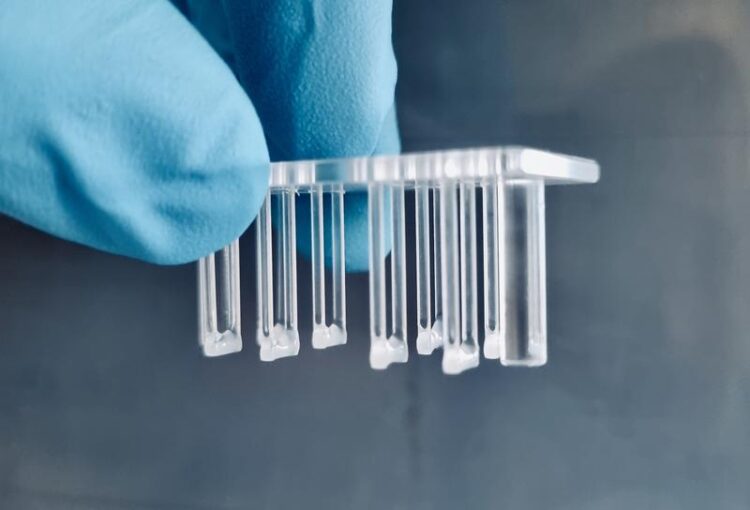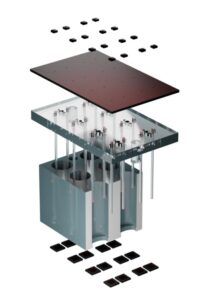Innovative 3D drug screening system

Closeup of the chamber system with muscle tissue attached to the elastic post system.
Credit: Arne Hofemeier
Biophysicist at Göttingen University receives ERC Proof of Concept Grant.
Professor Timo Betz, University of Göttingen, has been awarded a Proof of Concept (PoC) grant by the European Research Council (ERC) for his “TissMec” project to develop a 3D screening system to cultivate tissue and automatically stimulate and quantify its mechanical properties. PoC ERC grants provide top-up funding of €150,000 over 18 months to outstanding researchers, who have already received ERC funding, so that they can build on the innovation potential of their findings.

Credit: Till Münker
Betz and his team have developed a 3D cell culture chamber to grow muscle and other tissue using a system where they can use high-resolution microscopy and measure forces close-up in the cell. This new funding will enable them to extend the usability of the chamber to other tissues. One application of this system is drug screening. Getting a new drug to market can cost billions and is a hugely time-consuming and expensive process, which includes animal testing before human trials – the most costly and difficult parts. However, many promising compounds fail when tested on human subjects. In fact, they may prove to be ineffective or even harmful. This system should reduce the work and cost associated with this process, as well as the number of animal experiments that are required to test and validate future drugs.
In addition, the team’s enhanced laboratory version of the chamber system will allow scientists to mimic the mechanical situations that confront various living tissues in serious conditions, such as cardiovascular disease or muscular dystrophies. Betz explains: “Our new research project sets out to develop a system to enable automated functional screening of the effects of a compound on human tissue. It also means that scientists will be able to model different health conditions in the lab to get a better understanding of disease processes and treatments. This could be a game changer for the pharmaceutical industry as well as academic and medical research.”
Betz completed a PhD in 2007 in the Soft Matter Physics Division in Leipzig before taking up a postdoctoral position at the Institute Curie in Paris where he became a permanent researcher. After obtaining a professorship in Münster in 2016, he moved to the University of Göttingen in 2020. His research focuses on deciphering the fundamental physical processes within living cells leading to better health interventions as well as discovering new physical processes within the cell. His research includes developing a 3D tumour model to understand the mechanisms of rapid cell division in cancer cells, creating “optical tweezers” to understand the mechanical properties of a living cell, and a project to build a Lego microscope to inspire the next generation of scientists.
Contact:
Professor Timo Betz
University of Göttingen
Faculty of Physics – Biophysics Institute
Friedrich-Hund-Platz 1, 37077 Göttingen, Germany
Tel: +49 (0) 551 39 26921
Email: timo.betz@phys.uni-goettingen.de
www.betzlab.uni-goettingen.de/
Media Contact
Melissa Sollich
University of Göttingen
melissa.sollich@uni-goettingen.de
Office: 49-551-392-6228
Original Source
Media Contact
All latest news from the category: Physics and Astronomy
This area deals with the fundamental laws and building blocks of nature and how they interact, the properties and the behavior of matter, and research into space and time and their structures.
innovations-report provides in-depth reports and articles on subjects such as astrophysics, laser technologies, nuclear, quantum, particle and solid-state physics, nanotechnologies, planetary research and findings (Mars, Venus) and developments related to the Hubble Telescope.
Newest articles

New organoid with all key pancreas cells
Researchers from the Organoid group (previously Clevers group) at the Hubrecht Institute have developed a new organoid that mimics the human fetal pancreas, offering a clearer view of its early development….

Tasty, Airy Baked Goods with Culinary Foam made from Peas
Culinary foam made from the whites of chicken eggs makes baked goods light and airy. In the LeguFoam project, Fraunhofer researchers are working on a plant-based alternative made from legumes….

Biohydrogen from Wood Waste
Up to now, wood waste has had to be disposed of at great expense and, at best, has been used to generate energy in incineration plants. Fraunhofer researchers are now…



